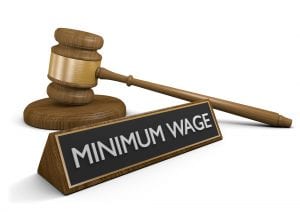Minimum Wage: What Your Small Business Needs to Know
An understanding of Minimum Wage laws is your first step to fairly paying your employees. These are dependent upon federal, state, and even municipal law. And they’ll fluctuate with time. Take note of these important laws, what they mean and how they can change.
What is the Minimum Wage?
US minimum wage, indicating the lowest hourly payment that an employer can provide, has a long history in defense of hourly paid workers. In response to “unlivable” wages, and as part of the Fair Labor Standard Act, a minimum wage was first required of employers in 1938. And in 2009, the current Federal minimum wage was set to $7.25. Despite this nation-wide standard, minimum wage varies from state to state and even among cities in accommodation for different costs of living and inflation. For example, California plans to raise its minimum wage to $15 an hour by January 2023. In states and cities that uphold a higher minimum wage than that which federal law requires, employees are entitled to the higher pay.
Which Business are Required to Pay Minimum Wage?
Any business consisting of two or more employees and earning over $500,000 in revenue is required to abide by the Fair Labor Standard Act and comply with the minimum wage requirement. However, Interstate Commerce businesses, as distinguished by the Department of Labor, are exempt from this obligation.
 As a business owner, we advise that you take note of these requirements for minimum wage in your area. Check out the Department of Labor website for up-to-date information on the quickly-changing standards. Remember that these vary among cities. And for California locals, beware of the heightened requirements that compete with the state’s high costs of living. You value your employees and their hard work. Keep up-to-date with payment requirements for the benefit of your business! And in the case that you need assistance with your company’s finances, do not hesitate to contact us at Prospect Financial Solutions!
As a business owner, we advise that you take note of these requirements for minimum wage in your area. Check out the Department of Labor website for up-to-date information on the quickly-changing standards. Remember that these vary among cities. And for California locals, beware of the heightened requirements that compete with the state’s high costs of living. You value your employees and their hard work. Keep up-to-date with payment requirements for the benefit of your business! And in the case that you need assistance with your company’s finances, do not hesitate to contact us at Prospect Financial Solutions!


